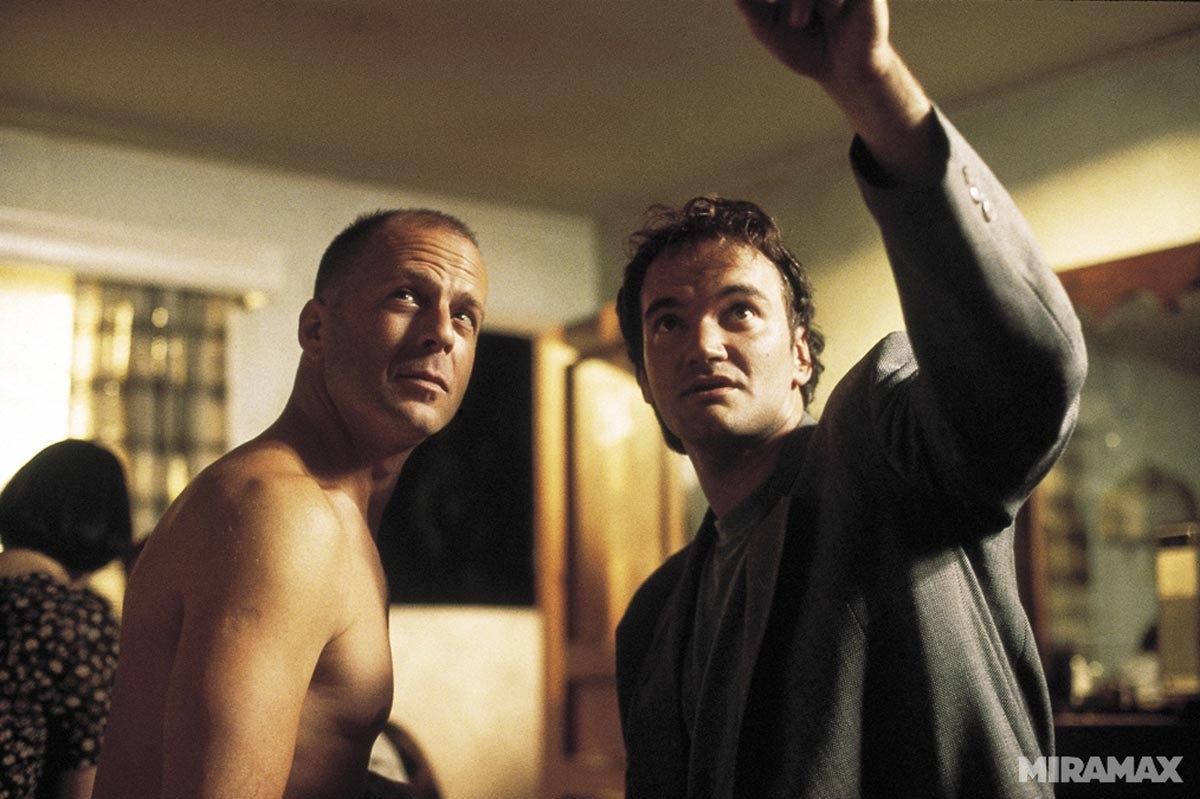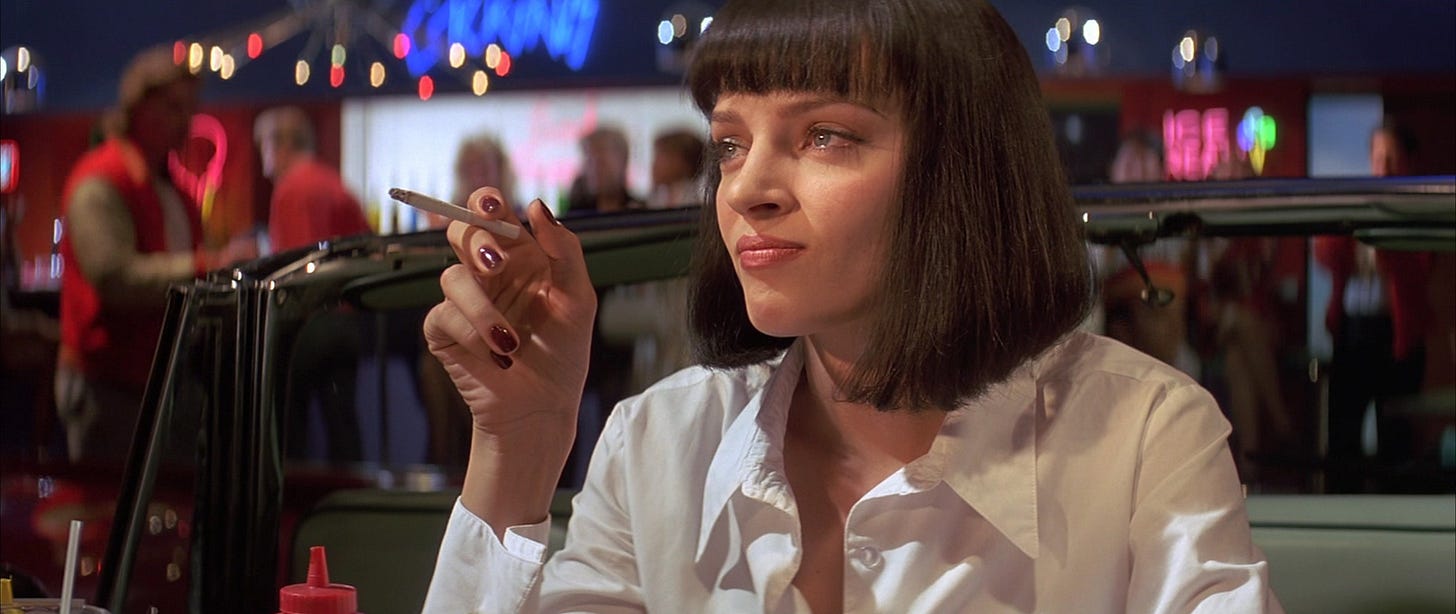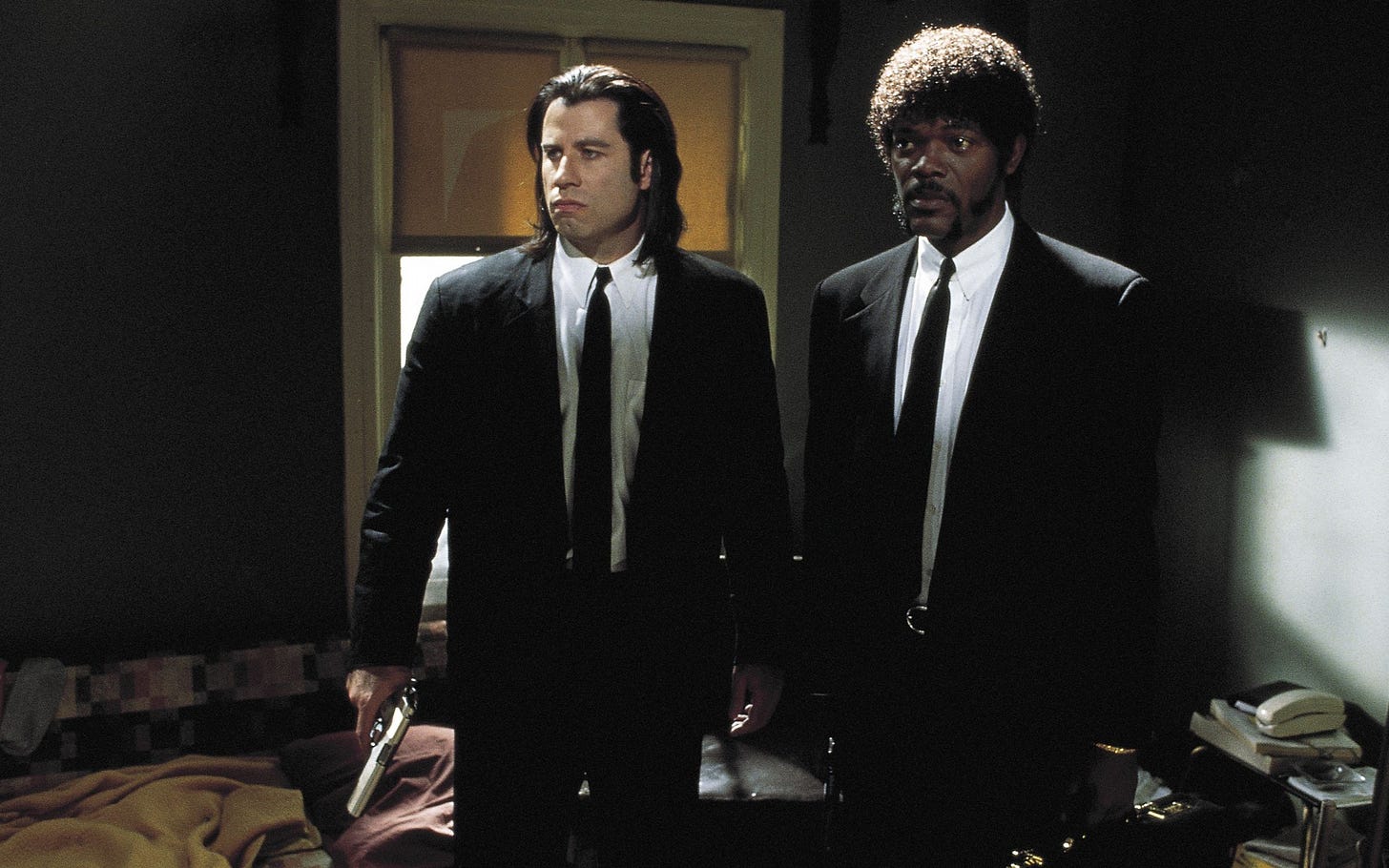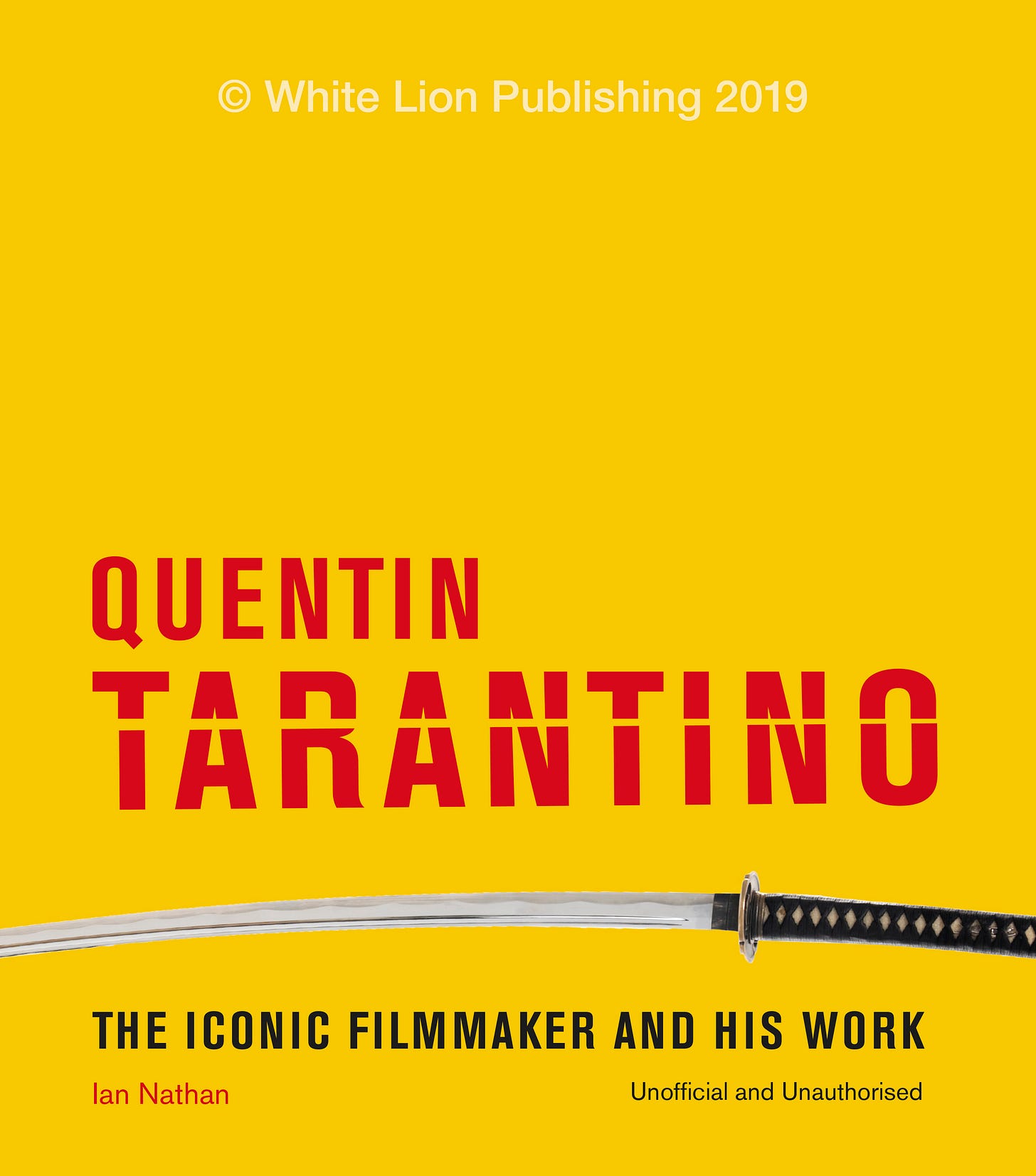The Five-Dollar Shake: Pulp Fiction At 25 (Only now it's 30!)
Quentin Tarantino's 1994 crime epic is the gift that keeps on giving
This week, or thereabouts (these anniversaries are coming thick and fast), Pulp Fiction turned twenty-five and Fight Club a sprightly twenty (can there really be only five years between them?). They both mark a much starker memorial: it was twenty-five years ago I was young.
Returning to the two films, I tried a preposterous thought experiment in which these two era-defining, hipper-than-thou sidelong epics take things out to the car park to throw a few punches for old times sake, see who was the better movie. But my imaginary fist fight became a dizzying mess of fictional characters absurdly hurling fists at their own faces, before collapsing in a heap of heroin-addled delirium. I couldn't figure out a punchline.
In any case, I realised I loved Pulp Fiction just that bit more and decided to explain why. Don't get me wrong I still like Fight Club plenty, but I'm not here to talk about that.
The idea for Pulp Fiction had been hatched in Quentin Tarantino's Video Archive days out of a vast, 500-page ur-text of interconnected crime stories called The Open Road. This was mostly a rat-eared pile of script pages, kind of the Dead Sea Scrolls of the Tarantino universe written in felt tip. Herein were the protean instalments of Natural Born Killers, True Romance and Reservoir Dogs, as well as the first two of the three interwoven tales of Pulp Fiction. At one stage, the failed heist of Reservoir Dogs was to be the third of its three stories, which would all feature Vic Vega (later to be Michael Madsen). With me?
Emotionally strung out and utterly compelling, Reservoir Dogs had gone its own way to become the launchpad of the Tarantino moment (now nearly thirty-years to the good), so instead Tarantino reworked one of former friend and Archivist Roger Avary's loose concepts about a troubled boxer who fails to take a fall as planned (who unfixes a fight) called Pandemonium Reigns. With Avary's help (the wellspring of their public falling out when it came to taking credit), Butch the boxer's frenzied getaway (or lack of it) would be braided between the two existing stories, and sticky plastered kingpin Marcellus Wallace (Ving Rhames) would be the through line. It's his briefcase the hitmen retrieve in story one, his wife, Mia, who is to be entertained in story two, and he who had organised for Butch to throw his fight.
Thankfully, Madsen got tied up making Wyatt Earp and Tarantino rewrote the character as Vincent Vega, his brother and one of those hitmen cum mob factotums and wrapping him in the sallow skin of John Travolta. In so doing he set a tone for his second film: jazzier, more textured and more melancholy than any of those other early-Tarantino crime stories. More amoral too. It's worth repeating how European a film Pulp Fiction really is, a riff on Godard's riff on American gangster movies, Bande à Part. It's kinda existential. A film about destiny in which the characters wrestle with the fact they are characters destined for predestined ends. With me?
The truth is, Pulp Fiction is a funny and humane film underneath its veneer of cool and surf guitar sounds, and between the snare strike of those famous high-frequency moments. You know: brains on the back seat, Uma Thurman speared with adrenaline, Bruce Willis vs the pawnshop rednecks (a backstreet Deliverance). Another unusually human aspect is how quickly the dial can get spun to panic stations. When the going gets tough, people go to pieces. Except Jackson's Jules, though he does get het-up. And Keitel's Winston Wolf.
What I always remember, however, is the elegant, unhurried vibe. All the irrelevant but relevant talk. The warm, slow hit of pure entertainment contained in simply hanging out with these characters. It's that sublime Tarantino quality: we enjoy his films most when they don't behave like films at all. Where traditional thrillers fret over exposition, Tarantino idles in ephemeral grooves on the taxonomy of fast food or the ethics of giving a foot massage (both highly complex). Counterintuitively the effect is thrilling — the characters unfurl into poignant and farcical dimensions.
I love Tarantino's description of the two hitmen arriving to retrieve a briefcase (but never cast any light upon its mystery contents) as exactly the kind of pre-credit gun-popping set-up you got in a Schwarzenegger movie. But here they have not yet 'got into character.'
Vincent and Jules, Travolta and Jackson, are like the Rosencrantz and Guildernstern of a Schwarzenegger multiverse — they mostly inhabit the before and after parts of the story, waiting in the wings, subject less to the rules of the game than the randomness of life. In other words, they spend most of the time out of character.
There's a highbrow, high octane essay to be written about the meta-fictional crossover between Pulp Fiction and Last Action Hero. I'll make some notes.
Such was their chemistry — this blue-eyed dopehead and gel-haired puritan are like Abbott and Costello Join the Mob — Vince and Jules, Travolta and Jackson, almost stirred a suite of movies out of Tarantino. He loved to watch them jive, dreaming up other crimes, more mishaps, the further adventures which never came to pass.
With his dewy eyes and sleepy smile, that quizzical glance, the brain quietly ticking away beneath jet-black rock-idol locks and middle-age paunch, Travolta is the mood master of Pulp Fiction. It's a masterful performance, goofy and lethal, a hired goon straining to keep it in his pants with the boss's wife. He's adorbs — for a heroin addict. Drugs shimmer through the film like a ghost dance. It's a waft of the outrageous. Tarantino's countercultural urge to shock and awe.
So back then, back before it all happened, Tarantino fell in love with the idea of a portmanteau movie (like Mario Bava's horror triptych Black Sunday but on the mean streets of Chandler and Hammett and Elmore Leonard), stacking up a trio of stories like blueberry pancakes. While editing Reservoir Dogs, he began to conceive of a mixed-up chronology. A way of tuning in and out of the different layers like radio stations, but underneath the film would make sense. It would still be blueberries, still pancakes. Watch Pulp Fiction again and again and you sense there is a start, a middle and an end. The trajectory of each of the characters has its own resolution — they are all on a learning curve, it just happens that the narrative is on different tracks.
What an electrifyingly confounding effect it is to witness Vincent's ignominious death (reading pulpy spy thriller Modesty Blaise on the crapper), only for him to return, right as rain, and saunter out of the film, automatic lodged into the elastic of his (actually Jimmie’s) shorts. This was pulped fiction. It put me on edge, I couldn't predict where things were going to end up because they may have already have ended up there. Was this still storytelling? There was still plenty of suspense. And all these characters and this Los Angeles tapestry of noir and salty crime, guns and molls and mishap, was supposed to be predictable.
Fight Club certainly doesn't hold with convention. Though it runs A to B to C to the breakdown of modern society, only occasionally rewinding, the nameless narrator, best known as The Narrator, is an unreliable guide. He's really not sure who he is. There's a magic in that big reveal: Tyler Durden as the hungry Id in a tawny leather jacket and the smug grin of Brad Pitt. Was it ironic we didn't get it?
Irony is the elusive constituent of Pulp Fiction. The characters are waking up to the outside world, and the fact they sprang from a forehead filled with film. This is, remember, Tarantino's movie-movie universe. They are archetypes getting ideas above their station. They are growing more and more fascinated by the reality around them. They get quotable on the quotidian. Especially Vincent. Travolta's sly curiosity, as if the hit is wearing off, is the soul of the movie.
It's deep man. One bad philosophical motherfucker.
Fight Club is a venomously funny and clever-clever movie (and I refuse, like Fincher, to take it at all seriously), but the effect was caustic, like swallowing vinegar. Fincher is exquisitely talented but he isn't as generous a director as Tarantino. Tarantino wants to share everything that occurs to him. He's all talk.
Pulp Fiction is built from other movies, but not to show off. This was a matter of instinct. Tarantino lived his life through movies and talking about nothing but movies, from carsploitation thrillers to the French New Wave, and Schwarzenegger if you pushed him. His films are a continuation of that dialogue. The way Pulp Fiction zigzags about in time is a match for Tarantino's pinball brain, bouncing from thought to thought then back again as it heads to the high score.
The references are never too obvious. Godard, he'll give you, but did you get Kiss Me Deadly for the glowing suitcase? You did? We've had twenty-five years to think about this: the whole film has been broken down into parts many times over: His Girl Friday, Out of the Past, Dragship Girl, The Graduate, It's a Wonderful Life, Mad Love, On the Waterfront, Shoot the Piano Player. What was it Tarantino said? I don't steal from any film, I steal from every film. Something like that.
The rape scene and the rednecks came, of course, from Deliverance — which Tarantino saw at the tender age of nine, little wonder it stuck with him. In Pumpkin and Honey Bunch, Roth and Plummer, there is a gesture of self-homage to Clarence and Alabama from True Romance, but in accordance with the QTCU, they should be out there somewhere. Alabama gets a namecheck in Reservoir Dogs, which features Vic Vega (Mr. Blonde), brother of Vincent, and so on and so forth. We were only visitors, Tarantino did this for a living.
Finally, let's talk style. Fight Club is all style, Pulp is pure style. With me? This is where Tarantino perfected his handwriting: those trunk's eye-view shots, the cars gliding along LA streets, the gleaming interiors (Jack Rabbit Slims is a whimsical treasure), the unblinking close-ups, the uninterruptible monologuing (Walken syncopating like Gene Krupa), the knock-out punchlines, the process shots, the whiplash pans, the sun-smeared exteriors, the symphony of subplots, distractions, random events, gags, pop cultural meanderings and that sense that it might be now, but it could be the seventies or the fifties or whenever it wanted to be.
That's a fact. Twenty-five years later Pulp Fiction is as timeless as ever.
Quentin Tarantino: The Iconic Filmmaker and His Work is out now










One of my favorite movies of all time. I think after The Matrix, this was the movie I rewatched the most. As a kid, I loved to memorize and recite every single line of Jackson's speech in the Apartment scene and the Diner scene. Had no idea the film started out as a part of some larger epic crime anthology. That's very interesting.